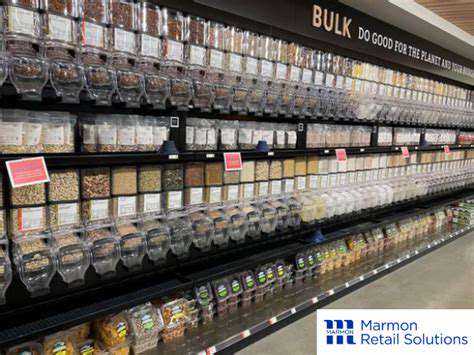Buying Bulk Foods: Save Money and Reduce Waste

Why the appeal?
Bulk foods have experienced a surge in popularity, attracting consumers with their promise of cost-effectiveness and environmental consciousness. The ability to purchase large quantities often leads to significant savings compared to pre-packaged items, making it a budget-friendly option for savvy shoppers. Furthermore, the environmental impact of reducing single-use packaging is a strong motivator for many.
The freedom to choose exactly the amount you need also appeals to many. This minimizes waste and allows consumers to customize their ingredient selection based on their specific needs and recipes. It's a refreshing alternative to the standardized portion sizes often found in pre-packaged products.
Ingredient Transparency
A key attraction for many buyers is the enhanced transparency offered by bulk bins. Consumers can often see the ingredients firsthand, gaining a clearer picture of the product's origin and quality. This direct interaction with the product can build trust and confidence in the sourcing and handling process.
Knowing precisely what you're getting, without hidden ingredients or additives, is a major plus for those with dietary restrictions or specific preferences.
Health and Dietary Benefits
Bulk foods, especially whole grains and legumes, often contain higher levels of nutrients compared to processed alternatives. This is because they haven't been stripped of essential vitamins and minerals during processing. This makes them a valuable addition to a healthy diet.
For those seeking specific dietary needs, bulk foods offer a wide range of options. The ability to select precise quantities ensures that individuals can tailor their intake to match their dietary requirements and preferences.
Cost Savings and Value
The most obvious appeal of bulk foods is the potential for significant cost savings. By purchasing in larger quantities, customers often receive a greater value for their money. This is particularly appealing in today's economic climate, where cost-consciousness is prevalent.
This significant cost savings can be especially valuable for families and individuals looking to stretch their food budgets further. The savings can be substantial when purchasing items like rice, beans, nuts, and dried fruits.
Environmental Consciousness
The reduced packaging associated with bulk buying is a major draw for environmentally conscious consumers. Minimizing waste and reducing reliance on single-use plastics resonates with those committed to sustainability. This resonates with a growing segment of the population concerned about the environmental footprint of their purchasing decisions.
Convenience and Customization
While some might perceive bulk buying as inconvenient, the increasing availability of organized bulk food stores and dedicated sections in supermarkets is making it more convenient. The ease of selecting your desired quantity often outweighs any perceived inconvenience.
The ability to customize your purchases based on specific needs and recipes also contributes to convenience. This personalized approach is a notable advantage in a world where consumers often seek greater control over their food choices.
Community and Social Impact
Bulk food stores often foster a sense of community among customers. The shared values of sustainability and cost savings can create a supportive environment. This sense of community can be a powerful motivator for choosing bulk foods.
The social aspect of choosing bulk foods can be a subtle but significant driver of purchasing decisions. The interaction with other customers and the store environment can contribute to a positive and engaging shopping experience.
Maximizing Savings: Strategies for Bulk Buying Success
Planning Your Bulk Purchases
Careful planning is crucial for maximizing savings when buying bulk foods. Understanding your household's needs and consumption patterns is paramount. Don't just buy in bulk because something is on sale; evaluate if you'll realistically use the quantity within a reasonable timeframe. Consider factors like storage space, potential spoilage, and how frequently you consume specific items. A well-thought-out plan minimizes waste and ensures you get the most value from your bulk purchases.
Inventorying your current pantry staples is a vital first step. Knowing what you already have on hand helps avoid unnecessary duplicates and ensures you're focusing on items you consistently use. This preliminary step provides a clear picture of your needs and allows you to target specific areas where bulk buying can offer the greatest savings. Proper planning also helps prevent overstocking, a common pitfall in bulk buying that can lead to wasted food.
Choosing the Right Products
Not all products are created equal when it comes to bulk buying. Some items lend themselves better to bulk purchasing than others. Non-perishable goods like rice, beans, pasta, and certain spices are excellent choices. These staples often see significant price reductions when bought in larger quantities. However, carefully consider the shelf life of the items and your storage space before committing to a large purchase. Evaluate what you regularly consume and consider the potential for spoilage.
Fresh produce, while often tempting to buy in bulk, might not always be the most cost-effective option. Frozen fruits and vegetables can often offer comparable nutritional value at a lower cost and with a longer shelf life, making them a more practical bulk buying choice.
Understanding Pricing Strategies
Bulk food retailers often employ various pricing strategies to attract customers. Understanding these strategies can help you make informed decisions. Pay attention to unit pricing, as this is a key factor in determining the true cost per item. Don't just focus on the total cost of the larger package; compare it to the price per ounce, gram, or unit to get the most accurate picture of the deal.
Look out for special promotions and discounts offered on bulk purchases. Many retailers offer exclusive deals for buying in bulk, which can significantly reduce the overall cost. Be mindful of expiration dates and remember that a great deal can be worthless if the product spoils before you can consume it. Compare prices across different retailers to ensure you're getting the best possible value.
Effective Storage and Preservation
Proper storage is essential for maintaining the quality and freshness of bulk foods. Properly storing your bulk purchases will keep them safe and edible for extended periods. Invest in airtight containers to prevent moisture and pests from affecting your food. Use appropriate storage solutions for various products, ensuring that you store them correctly to maintain their quality. Proper storage practices will prevent spoilage and extend the shelf life of your bulk purchases.
Maximizing Savings with Loyalty Programs
Loyalty programs offered by some bulk food retailers can significantly enhance your savings. These programs often reward frequent buyers with discounts, exclusive offers, and other perks. Sign up for these programs to leverage the advantages they provide. Take advantage of any rewards programs offered by your chosen retailers. Loyalty programs can provide substantial savings over time, making bulk buying even more economical.
Consider the long-term benefits of these programs before committing to a retailer. The savings from participating in bulk buying combined with loyalty programs can significantly impact your grocery budget.

Divorce is a significant life event that can profoundly impact an individual's physical and emotional well-being. The stress associated with navigating legal processes, financial adjustments, and the emotional upheaval of separating from a partner can manifest in various ways, including sleep disturbances, loss of appetite, and increased anxiety. Recognizing these potential effects is crucial for proactively addressing them and fostering a path towards healing and recovery.
Minimizing Waste: Planning and Portioning Strategies
Planning Your Purchases
Careful planning is crucial when buying bulk foods to avoid waste. Consider your household's dietary needs and eating habits over the next few weeks. Create a meal plan that incorporates the bulk foods you're purchasing. This pre-planning helps you accurately estimate portions and prevents buying more than you'll realistically use, leading to significant savings and reduced waste. It's also a great way to introduce new recipes and explore different cuisines, making your meals more interesting.
Portioning for Success
Proper portioning is key to minimizing food waste. Invest in reusable containers of various sizes to accurately portion your bulk items. Freezing is a fantastic way to preserve portions for later use. Label each container clearly with the contents and date, making it easy to track what you have and when it was prepared. This organized approach significantly reduces the likelihood of forgotten or spoiled food.
Consider portioning items into smaller, individual servings. This is especially helpful for meals like snacks, lunches, or side dishes, which are often consumed in smaller quantities. Portioning into individual servings ensures that you don't have to re-portion every time you want a snack or a side dish, saving you time and reducing the risk of overeating.
Storage Solutions for Bulk Foods
Proper storage is essential to maintain the quality and freshness of your bulk foods. Invest in airtight containers or bags to prevent moisture buildup or pest infestation. Choose storage solutions that are suitable for the specific food item, such as vacuum-sealed bags for long-term storage of grains or specialized containers for dry goods.
Freezing is an excellent method for preserving bulk foods like fruits, vegetables, and even some grains. Freezing prevents spoilage and allows you to use these ingredients in recipes throughout the year. Properly freezing your bulk items ensures quality and saves you money in the long run.
Utilizing Leftovers and Scraps
Don't let leftover cooked grains or vegetables go to waste. Repurpose them into new dishes. Leftover rice can be used in fried rice, casseroles, or even as a base for salads. Leftover vegetables can be added to soups, stews, or stir-fries. This creative approach helps you maximize the use of your bulk purchases and drastically reduces food waste. Plus, it's a great way to add variety to your meals and explore different cooking techniques.
Creative Meal Planning for Bulk Items
Bulk foods offer exciting possibilities for meal planning. Explore recipes that incorporate your bulk purchases into different dishes. If you buy a large bag of lentils, consider making lentil soup, lentil loaf, or lentil salads. This approach helps you get the most out of your investment, ensuring you don't feel stuck with the same meal repeatedly. By diversifying your recipes, you'll also discover new flavors and culinary experiences.

- Low Carb Breakfast Ideas: Keto Friendly and Satisfying
- Baking Tips and Tricks: Achieve Perfection
- Grilling Basics: Perfect Burgers Every Time
- Vegetarian Lunch Ideas: Wholesome and Satisfying
- Homemade Flavored Water: Healthy and Refreshing
- Low Sodium Meal Ideas: Heart Healthy and Delicious
- Homemade Nut Butters: Healthy and Creamy
- Simple Lentil Recipes: Hearty and Healthy
- Authentic Ethiopian Lentil Stew: Misir Wot
- Simple Lamb Chops: Quick and Flavorful
- Low Carb Breakfast Casserole: Keto Friendly Morning
- Kitchen Storage Solutions: Maximizing Space